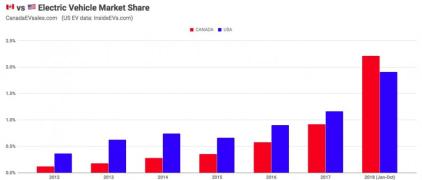
Electric Vehicle Market in Canada & the US. Chart by Matthew Klippenstein.
In January, Québec became the first province to implement a Zero Emission Vehicle (ZEV) mandate where automakers have to sell a certain percentage of electric cars. They have set a goal of having 100,000 electric or hybrid vehicles on provincial roads by 2020, and one million by 2030. Currently, 3.5% of 2018 vehicle models sold in Quebec must be electric or plug-in hybrids. This will increase to 15.5% by 2020, and 22% by 2025. This mandate mirrors US state regulations in California and 9 other states.
And while the adoption of electric vehicles may be slower in Canada than in other countries, progress has been made in British Columbia!
ALL NEW light-duty cars and trucks sold in British Columbia will be zero-emission by 2040!
The legislation, planned to be introduced next spring by the province, will implement the requirements in stages:
- 10% by 2025
- 30% by 2030
- 100% by 2040
B.C.’s transportation sector accounts for 37% of the GHG emissions, with 3.7 million light and heavy vehicles on the road, and only about 1.5% of them being electric (EV). In contrast, the purchase of new EVs make up to 3.5% of the total sold in the first half of 2018, according to Clean Energy Canada.
Sales of new EVs are booming in Canada, exceeding the 2% market share threshold (for the first time higher than in the US). In B.C., where sales are over three times the rate of other provinces, the government is increasing its purchase incentive program by $20 million this year, for a total of $57 million. Eligible EV buyers will continue to receive between $5,000 and $6,000 in incentives. And while B.C. already has a network of charging stations, the government will more than double the number of fast-chargers available to the public from 71 to 151.
The shift to EVs is global. Some companies have acknowledge this, as other countries are pushing ahead with more progressive agendas:
- China is aiming for 10 % by 2019;
- Germany, India, Ireland, Israel and the Netherlands plan to stop non-EVs sales by 2030;
- France, Scotland and the UK have promised to do the same a few years later.